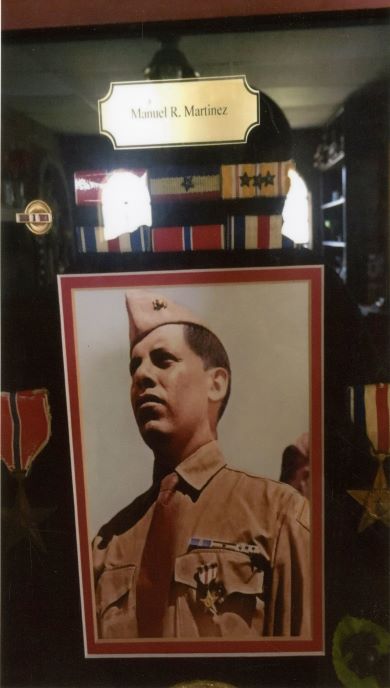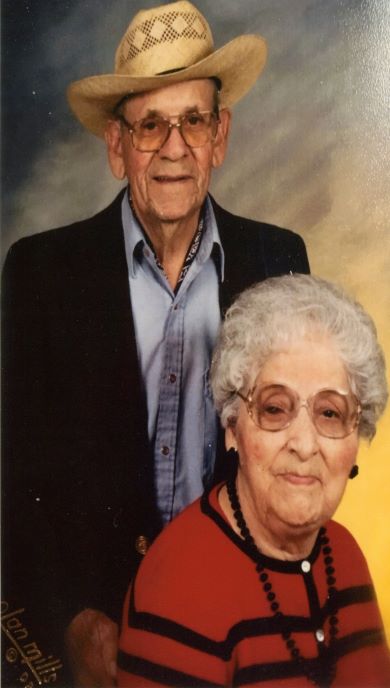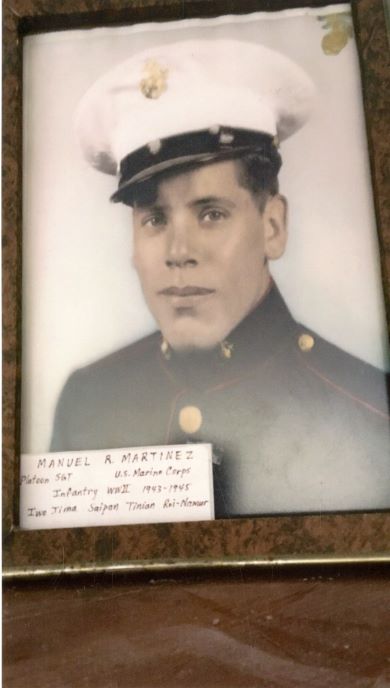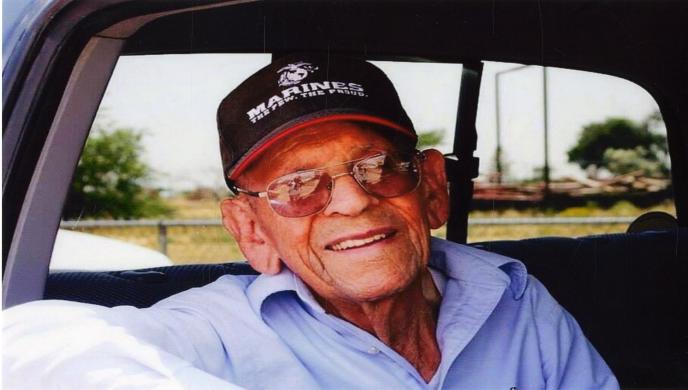
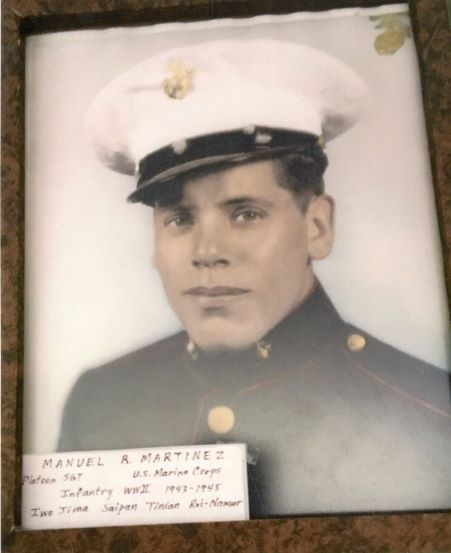
Record date:
Manuel R. Martinez Transcript.pdf
Manuel "Marty" R. Martinez, 1st Sergeant, US Marine Corps
Combatants are bombarded with challenges throughout a campaign. Yet Manuel “Marty” Martinez’s mind and body were already conditioned for this, having grown up quickly during the Depression. His maturity allowed him to withstand the trenches of war and the tormenting losses post-war.
Born in September of 1922 in Seneca, New Mexico, Martinez was the middle child in between a pair of sisters. His mother and father owned and ran the local post office and store as well as their own farm. At a young age, Martinez already become accustomed to long distance ventures when he had to travel to attend high school each week. Similarly, he was also no stranger to physical work, having tended to the sheep and other animals since he was eleven years, in addition to doing his schoolwork. This intensified, when Martinez was needed to the support the family, after 11th grade, when his father became ill. He built dams for his neighbor’s farm, which entailed working solo with four horses. After two years, his determination to finish school did not falter and he graduated Clayton High School when he was twenty years old. He then attended Highlands University in Las Vegas, New Mexico for one semester.
After the bombing of Pearl Harbor by the Japanese, several young men in town enlisted in the military. Figuring his draft number would come up soon, Martinez enlisted in the US Marine Corps. He was sent to San Diego for boot camp and Camp Pendleton for basic training, which he didn’t find difficult thanks to his tough upbringing. “Actually... all that training... it was kind of a vacation for me,” Martinez laughs.
Martinez sailed from San Diego to fight in the Pacific theater in January of 1944 and participated in four different campaigns--Kwajalein Atoll, Saipan, Tinian, and Iwo-Jima--as a scout, which would be in the front of the platoon during missions to survey the area for enemy soldiers. This would put Martinez in significant danger throughout his tenure in the Pacific, but it also might have saved his life because the enemy would wait for him to pass before they attacked, he says.
After each campaign, Martinez and his division returned to Maui, Hawaii. Regarding training, he said,
“[The officers] knew the island and would train you accordingly to where you were gonna land, But we never knew for sure until we got aboard ship… but the way you trained, you kinda knew what kind of landing it was gonna be.”
While on campaigns, fighting was never far from Martinez and his squad, even hand-to-hand combat. His squad was anticipating an attack from the Japanese on the island of Tinian and dug themselves into hiding and awaited the enemy. “That was one of the worst times I ever had… just waiting for them,” he says. When the Japanese were close enough, they countered attacked using their bayonets and knives.
Before Tinian, though, Martinez experienced the wounding and or loss of comrades. During the invasion of Saipan, Martinez was under enemy fire for the first time and on the beach, there was no time to dig in for protection, they could only hit the ground. A close friend of his was unlucky and had his arm blown off from a mortar. “Marty, give me a hand!” he screamed. Martinez gave him a shot of morphine to ease his pain, but he had no choice but to move on.
1st SGT Martinez tried his best to protect non-combatants such as encouraging Japanese hiding in caves to emerge. In another instance, his sharp sense of observation, informed him that the moving figures were two children and an old lady, thus commanding his friend not to shoot.
Martinez and his heroism fortunately did not go noticed and was awarded multiple medals: the Bronze Star for his service in Saipan; the Silver Star for his service in Iwo-Jima; and two Presidential Unit citations.
Martinez married shortly after he returned home and had three children, two boys and a girl. He sought medical help for what seems to have been PTSD, but it was not identified. He successfully dedicated himself to work and to family, thus, in time overcoming it. He was successful in his profession as master plumber who eventually owned his own business. Sadly, his son and his daughter, unfortunately died early in life at fifty-seven and twenty-two, respectively.
Even with all the heavy losses throughout his life, though, Martinez still finds solace in belief:
“First of all, you gotta have that faith. Believe in something,” he says. “I’m thankful for who I am. Try to be the best you can because that’s all."










